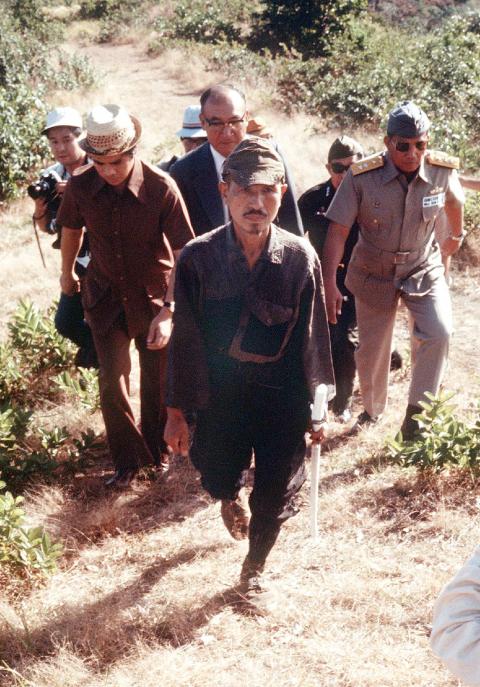A Japanese soldier who hid in the Philippine jungle for three decades, refusing to believe World War II was over until his former commander returned and persuaded him to surrender, has died in Tokyo aged 91.
Hiroo Onoda waged a guerrilla campaign on Lubang Island near Luzon until he was finally persuaded in 1974 that peace had broken out.
Leaflet drops and other efforts to convince him the Imperial Army had been defeated were unsuccessful and it was only a visit from his former commanding officer, who ordered him to lay down his arms, that brought an end to his one-man war.

Photo: AFP
Onoda was the last of several dozen so-called holdouts scattered around Asia, men who symbolized the astonishing perseverance of those called upon to fight for their emperor.
Their number included a soldier arrested in the jungles of Guam in 1972.
Trained as an information officer and guerrilla tactics coach, Onoda was dispatched to Lubang in 1944 and ordered never to surrender, never to resort to suicidal attacks and to hold firm until reinforcements arrived.
He and three other soldiers continued to obey that order long after Japan’s 1945 defeat. Their existence became widely known in 1950, when one of their number emerged and returned to Japan.
The remaining men continued to survey military facilities in the area, attacking local residents and occasionally fighting with Philippine forces, although one of them died soon afterwards.
Tokyo and Manila searched for the remaining two over the next decade, but ruled in 1959 that they were already dead.
However, in 1972, Onoda and the other surviving soldier got involved in a shootout with Philippine troops. His comrade died, but Onoda managed to escape.
The incident shocked Japan, which took his family members to Lubang in the hope of persuading him that hostilities were over.
Onoda later explained that he had believed attempts to coax him out were the work of a puppet regime installed in Tokyo by the US.
He read about his home country in newspapers that searchers deliberately scattered in the jungle for him to find, but dismissed their content as propaganda.
The regular overflight by US planes during the long years of the Vietnam war also convinced him that the battle he had joined was still being played out across Asia.
It was not until 1974, when his old commanding officer visited him in his jungle hideout to rescind the original order, that Onoda’s war eventually ended.
In his formal surrender to then-Philippine president Ferdinand Marcos, Onoda wore his 30-year-old imperial army uniform, cap and sword, all still in good condition.
Asked at a press conference in Japan after his return what he had been thinking about for the past 30 years, he told reporters: “Carrying out my orders.”
Onoda had difficultly adapting to the new reality in Japan and in 1975 emigrated to Brazil to start a cattle ranch, although he continued to travel back and forth.
He later was head of a children’s nature school in northern Japan.

‘TERRORIST ATTACK’: The convoy of Brigadier General Hamdi Shukri resulted in the ‘martyrdom of five of our armed forces,’ the Presidential Leadership Council said A blast targeting the convoy of a Saudi Arabian-backed armed group killed five in Yemen’s southern city of Aden and injured the commander of the government-allied unit, officials said on Wednesday. “The treacherous terrorist attack targeting the convoy of Brigadier General Hamdi Shukri, commander of the Second Giants Brigade, resulted in the martyrdom of five of our armed forces heroes and the injury of three others,” Yemen’s Saudi Arabia-backed Presidential Leadership Council said in a statement published by Yemeni news agency Saba. A security source told reporters that a car bomb on the side of the road in the Ja’awla area in

PRECARIOUS RELATIONS: Commentators in Saudi Arabia accuse the UAE of growing too bold, backing forces at odds with Saudi interests in various conflicts A Saudi Arabian media campaign targeting the United Arab Emirates (UAE) has deepened the Gulf’s worst row in years, stoking fears of a damaging fall-out in the financial heart of the Middle East. Fiery accusations of rights abuses and betrayal have circulated for weeks in state-run and social media after a brief conflict in Yemen, where Saudi airstrikes quelled an offensive by UAE-backed separatists. The United Arab Emirates is “investing in chaos and supporting secessionists” from Libya to Yemen and the Horn of Africa, Saudi Arabia’s al-Ekhbariya TV charged in a report this week. Such invective has been unheard of

US President Donald Trump on Saturday warned Canada that if it concludes a trade deal with China, he would impose a 100 percent tariff on all goods coming over the border. Relations between the US and its northern neighbor have been rocky since Trump returned to the White House a year ago, with spats over trade and Canadian Prime Minister Mark Carney decrying a “rupture” in the US-led global order. During a visit to Beijing earlier this month, Carney hailed a “new strategic partnership” with China that resulted in a “preliminary, but landmark trade agreement” to reduce tariffs — but

SCAM CLAMPDOWN: About 130 South Korean scam suspects have been sent home since October last year, and 60 more are still waiting for repatriation Dozens of South Koreans allegedly involved in online scams in Cambodia were yesterday returned to South Korea to face investigations in what was the largest group repatriation of Korean criminal suspects from abroad. The 73 South Korean suspects allegedly scammed fellow Koreans out of 48.6 billion won (US$33 million), South Korea said. Upon arrival in South Korea’s Incheon International Airport aboard a chartered plane, the suspects — 65 men and eight women — were sent to police stations. Local TV footage showed the suspects, in handcuffs and wearing masks, being escorted by police officers and boarding buses. They were among about 260 South